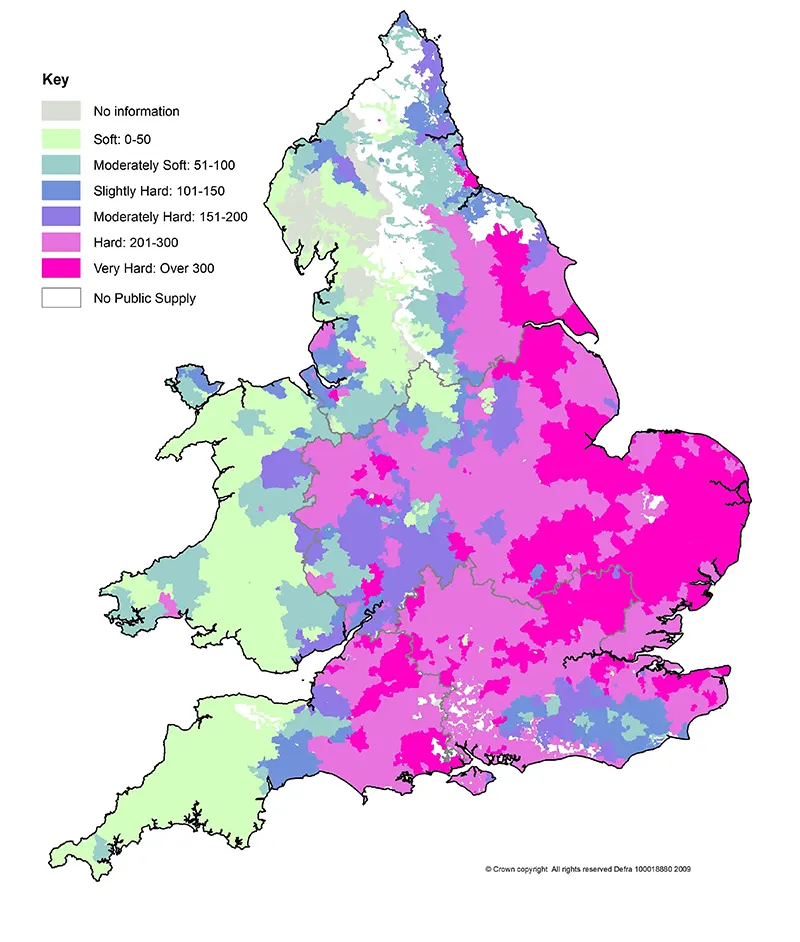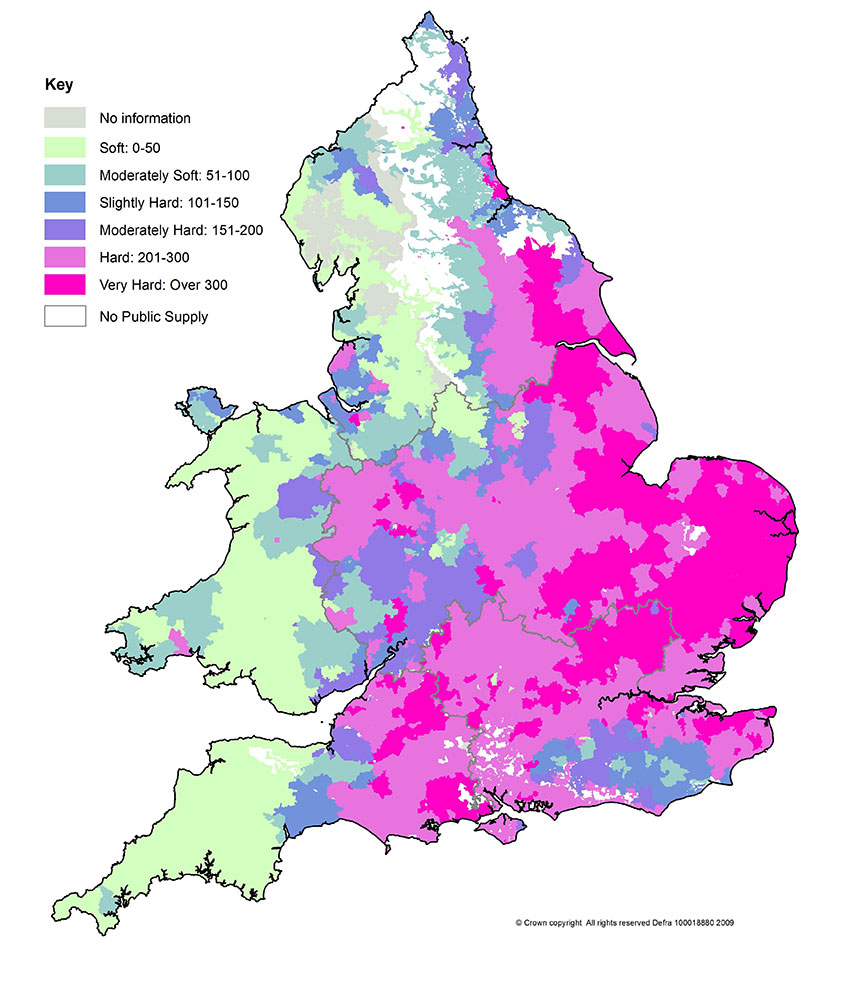Will a Hard Water filter help you?
- Products
- by Louise
- 17-05-2018

What is Hard Water?
The hardness of your water is all down to the geology of the area you live in.
You'll have hard water if you live in an area that's built on a bedrock of sedimentary rocks like limestone, chalk, flint and sandstone.
The South East of the UK is mainly made up of chalk and limestone regions and as a result, has the hardest water.
Hard water has a high mineral content. The minerals that contribute to water hardness are calcium and magnesium, mainly in combination with bicarbonate, sulphate and chloride.
When hard water is heated above 61 degrees (or as it evaporates) the balance between the dissolved minerals is upset and the bicarbonate converts to carbonate.
This is what causes limescale!
Around 60% of the UK population lives in a hard water area.
Water hardness can be measured usually as the equivalent amount of calcium carbonate in parts per million (mg/l).
Here's a list of UK towns and cities that have the hardest water:
| Town/City | Water Hardness Level | Mg/l CaCo3 |
| Bath | Very Hard Water | 307 |
| Bristol | Hard Water | 232 |
| Guildford | Hard Water | 238 |
| Hemel Hempstead | Very Hard Water | 303 |
| Milton Keynes | Very Hard Water | 308 |
| Oxford | Hard Water | 279 |
| Reading | Hard Water | 278 |
| Slough | Very Hard Water | 304 |
| Swindon | Very Hard Water | 349 |
| Walton-on-Thames | Hard Water | 238 |
UK counties with the hardest water are:
| County | Water Hardness Level |
| Bedfordshire | Hard to Very Hard |
| Berkshire | Hard to Very Hard |
| Buckinghamshire | Hard to Very Hard |
| Cambridgeshire | Hard to Very Hard |
| Dorset | Hard to Very Hard |
| Essex | Hard to Very Hard |
| Gloucestershire | Hard to Very Hard |
| Greater London | Moderately Hard |
| Hampshire | Hard to Very Hard |
| Hertfordshire | Hard to Very Hard |
| Kent | Hard to Very Hard |
| Oxfordshire | Hard to Very Hard |
| Surrey | Hard to Very Hard |
| Sussex | Hard to Very Hard |
| Wiltshire | Hard to Very Hard |

Is hard water bad for you?
No...
"there does not appear to be any convincing
evidence that water hardness causes adverse health
effects in humans" – World Health Organisation
The minerals that are present in your water such as Calcium and Magnesium are essential for maintaining your health, so getting some of your daily mineral intake from the water supply will supplement your diet.
There is nothing harmful about drinking hard water. Bottled water companies often boast of the high mineral content of their water because of the associated health benefits.
So, if it's safe to drink why do people want to treat it?
Because it causes limescale which has many visible and hidden effects. And it's only when water is heated that it causes a problem.
The visible things are:
- Filmy residue that floats on your hot drinks.
- Limescale builds up on kettles
- Shampoo and soap may not lather easily
- Limescale on shower heads and taps
- Shower screens become cloudy
- Toilet bowls collect limescale
- You may need to use more washing up liquid and washing powder
- Skin conditions such as Eczema may occur
- Hair and skin may be dull
- A red rust-coloured build up may occur on shower tiles in some areas of the UK where water has higher Iron content
- Clothes and towels may be stiff and rough
- Glasses and dishes may become cloudy and dull
- White fabrics may become grey and coloured fabrics may lose their brightness
- A chalky residue may be left when washing your car at home
- Kettling, a low rumbling sound, may be heard as the boiler starts up
- Weak water pressure may occur in the shower
The effects of limescale that are hidden include:
- Build up in household water and heating pipes reducing water flow and pressure
- Build up in appliances, reducing their efficiency and lifespan
- Build up in immersion heaters reducing the lifespan and efficiency
- Build up on the heat exchanger in the boiler reducing efficiency and lifespan of the boiler, making it harder to heat your home
- Energy bills increase as an inefficient heating system may need to be on for longer to heat the house and appliances use up more energy to get their job done
- Maintenance costs for appliances are increased as they work harder than they would without limescale build up and therefore elements wear out quicker
- Appliances and boilers need replacing more often as it’s sometimes more efficient to replace the whole appliance or boiler than a single element
- Lower hot water temperatures in the heating system are possible as limescale build up prevents heat from the boiler transferring easily into the water
Our Hard Water Filters
Drinking water with any of our hard water filters installed may form a residue on the water after it's been heated to over 60°C. Some people find this unacceptable.
If you think this residue is unsightly and want to get rid of it you may need to consider installing a reverse osmosis (RO) system.
The downside to reverse osmosis is that you lose any health benefits of the natural minerals that are found in your water as a reverse osmosis system strips everything out. You also need a power supply and it can be expensive as you lose about 70% of your water with a reverse osmosis system.
Please get in touch before you order a hard water filter from us so we can chat to you about what the effects of the hard water is having on you and your household.


